Wikipedia in Bhutan: poison and antidote & Integrated energy systems modeling to inform Bhutan’s carbon neutral challenges and opportunities
This session addresses two critical issues in Bhutan’s development: the role of Wikipedia in shaping public knowledge and the challenges of achieving carbon neutrality. The first part delves into the impact of Wikipedia on Bhutan, considering it both as a valuable resource and a potential source of misinformation. While Wikipedia provides accessible information to a broad audience, the session examines concerns about the accuracy and reliability of content, especially in the context of Bhutan’s unique cultural, political, and environmental landscape. The discussion also explores how Bhutan can harness Wikipedia’s potential while addressing these challenges through better curation and local contributions.
The second part shifts focus to Bhutan's energy and environmental future, particularly the role of integrated energy systems in supporting the nation’s carbon-neutral goals. The session explores how energy modeling can inform policy and decision-making, highlighting the opportunities and challenges Bhutan faces in transitioning to a sustainable, low-carbon economy. This includes the integration of renewable energy sources, energy efficiency measures, and carbon management strategies to achieve Bhutan’s ambitious targets. Together, these topics provide a comprehensive view of the intersection between digital knowledge and environmental sustainability in Bhutan’s evolving development landscape.




